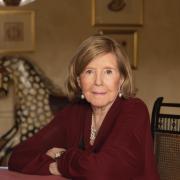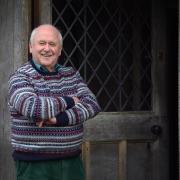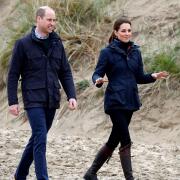The BBC has announced that it is to screen another series of the hit TV show Mortimer & Whitehouse: Gone Fishing this autumn. We meet the Norfolk angling expert who makes it happen behind the scenes.
It is one of the biggest television hits the BBC has enjoyed for years; gentle, great-looking, life-affirming viewing.
If you haven’t seen it, the premise is simple; long-time friends and comedians Paul Whitehouse and Bob Mortimer visit beautiful fishing spots around the UK and try and catch fish. On paper, it doesn’t sound like must-see TV.
But the actuality of it is something rather lovely. Our two friends have a shared history of serious heart conditions, in Bob’s case almost fatal. They speak openly about their shared experiences and about topics that men of a certain age tend not to talk about. It helps that they are also funny guys.

Tied in with their obvious affection for each other, the gorgeously-filmed locations, occasional star guests and, yes, the angling, it makes for viewing of rare quality.
One of the architects of this fishy success story is renowned angler, author and former Norfolk school teacher John Bailey. He is a key player in the programme – his is the first name to appear on the credits after the show’s stars – so how did he come to be involved?
“Just part of my generally outrageously lucky life!,” he laughs. “I had known Paul a little bit, very casually. It began really as just a conversation between Paul and Bob in a pub. It then escalated, I was in on the second or third meeting and then invited down to London to see if I was interested.
“Knowing Paul and liking him hugely it was easy to say ‘yes’,” says John.

“There was a feeling that because I’d game fished and coarse fished equally and done quite a lot of bass and mullet fishing in Norfolk that I had a handle on all the fishing disciplines.
“Also, because I’d travelled for fishing in the UK and abroad, I sort of knew my way around and would be able to come up with venues. So, I was offered the gig.”
They were all quite relaxed about it when they came to film series one, says John. “I don’t think any of us thought it would really particularly succeed and I don’t think any of us thought beyond the first six episodes.
"I can remember the very first episode up in Derbyshire; we all rocked up – we didn’t really have a clue what we were doing! I recall Paul and Bob standing on a bridge overlooking a river looking at each other and saying ‘what the hell do we do now?’
“Paul and Bob were immensely nervous about it. They’d both been involved in projects which failed in the past, as well as loads of successful ones. But as Paul said to me, ‘if anything failed in the past, we could just blame it on the script’”

“But the problem with Gone Fishing is that there is no script, so if it had failed, they’d realise people didn’t like them! So, they were very twitchy about the whole thing.”
They needn’t have been. It was an instant hit. One of the key parts of its success, says John, is that the programme has integrity.
“I think that one of the things we learned very early on in the process is that we had to be absolutely, utterly, 100% honest about everything we did. Bob is not a great angler and very early on I tried to catch a fish to give him the rod and it just did not work.
“So, we got together and said we’re going to film this, warts and all, and exactly what happens will be filmed and that is what the viewer will see,” he says.

It is an approach which has clearly struck a chord with the viewers. “I think Paul and Bob are overwhelmed by the way it has been received – they are eternally grateful for that. They bend over backwards in every way they can to help angling, they love angling, they love the effect that the programmes have had and I’ve been very glad to be a part of it. Very proud indeed.
“As the series have followed each other I have become more and more involved episode by episode, and equally my relationship with Paul has deepened so we now speak probably two or three times a day,” says John.
He is deeply embedded in the process. “I spend a lot of time recceing, a lot of time on the road going to places and meeting people and talking to local experts and, wherever necessary, I spend a lot of time preparing.”
For example, for the tench fishing film in Norfolk he was at the lake for days preparing the spots for Paul and Bob, putting bait in to attract the fish, getting rods up and so on.

“I look out for people who can help, appear in interviews, look for the nice shots, look for wildlife, I do quite a bit and have input into the filming as well. It’s just something I love. It’s a very creative thing working with very lovely people.”
One of the show’s strengths is the Ying and Yang of Paul and Bob in terms of their angling skills. Paul is a talented fisherman, knowledgeable and patient; Bob came to the show as a beginner, but has grown under the watchful tutelage of Paul and John.
“Sometimes I wonder if we’ve had any impact at all! I spend a lot of time with Bob off-camera, a huge amount of time, and he has got better, there’s no doubt about that,” says John.
“Paul and I don’t know whether sometimes he makes mistakes for comedic effect, or whether he actually is what you see... Paul and I don’t know that, and I don’t think Bob knows that.
“But there are times increasingly in the last couple of years, when I’ve watched him and thought ‘hang on a minute, you’re not a half-bad angler now.’”

John says that Bob will go fishing on his own now. When he started, he would not have considered doing that.
Over the four series the attention has shifted away a little from the actual fishing and so Paul is keen that when they do catch a fish, it is something worthwhile.
“I think Paul is aware of the fact that the programme has developed a life of its own and it’s not completely dependent on fishing so, when we do fish, if we can catch something that makes people sit up, that’s all to the good,” he says.
And he is appreciative of the wider appeal of the programme.
“I like to think the programme does address issues that are serious and issues that have been a bit taboo in the past. Paul and Bob are of an age where they can talk about life’s problems with experience, they don’t shirk any issues at all, in fact they are often so truthful, so down-to-earth and so blunt that we have to edit it out!

“What they manage to get across is that the fishing we do, the places we go to, it’s a real celebration of fishing, yes, but it’s also a celebration of the life we have and the life we’re gifted with and I think that comes across.
“In many ways they are very sensitive life guides. They’re good friends to have – there's a lot of wisdom there.”
I ask John if there is to be a fifth series, but like a wily brook trout he won’t be hooked...

About John
John was born in Manchester, but spent many happy childhood holidays in north Norfolk at his parent’s home in Blakeney before eventually moving to the county.
He had two loves, football and fishing. A talented player, he might have gone down that career path, though he modestly says that, “A) I probably wasn’t a good enough and B) in those formative years I was spending too much time on history and English and things,” to go down the pro route.
He remembers catching his first fish: "The very first accredited catch was probably netting a one-eyed roach from a northern canal when I was about four and a half with a shrimping net. That was my biggest moment for quite a while!”
The young Bailey spent hours fishing the little rivers of north Norfolk for minnows, gudgeon (small fish) roach and bream, slowly building the skills and knowledge which have stood him in good stead.

After university he moved to teaching, first at Sprowston and later at Norwich School. It was while he was at the school in 1989 that his career took on a new direction when he was offered the chance to make an hour-long film for ITV about fishing in the Himalayas.
“That got me into TV, into travelling in 1989 and really for the next 15-16 years most of my fishing was abroad, on the continent and India,” he says. “There were other niche destinations like Mongolia, which I visited about 15 times. It was a great life – some magnificent memories.”
He has also been a prolific and respected writer, with more than 50 books to his name and columns in the specialist angling press and the EDP.
Nowadays, when he’s not zipping around the country working on Gone Fishing, he is a guide, helping others learn from his vast knowledge of angling and watercraft. He rarely fishes himself.
“I would say, completely genuinely and hand on heart, is that I very rarely catch fish now myself because I’m with people helping them to catch fish and in actual fact I’m genuinely far, far more excited to see other people catch fish.
“I don’t need to catch anything again as long as I live, providing people I’m with and people I like are doing it and getting that huge buzz from it,” he says.

Angling has enjoyed a huge boom recently, with many proponents saying that it has a positive effect on mental health.
“It is absolutely true to say that I know people who do regard angling as a way to mindfulness and a more contented life. Life is stressful, it is unrelenting and I think that when I do guide people for example, I’m fairly sure that for eight or ten hours their phone is generally off, they’re not thinking about the office, they’re not thinking about the mortgages, they’re not thinking about job insecurity, they’re just thinking about where they are and everything in the moment and that itself has got to be good,” says John.
He adds that the popular image of the angler snoozing in a chair is rubbish. “If you are fishing properly, it is a very, very involving sport. If you’re not catching you wonder why, and if you are catching, you’re enjoying the moment. Fishing is hugely engrossing and engaging and it takes you out of yourself and out of your day-to-day life.”
His wife Enoka shares his love of fishing, though as a rule women are a rarity on the riverbank. John says that this appears to be a particularly English situation as women anglers are a common sight in the USA and on the continent. He believes male chauvinism and even aggression have played their part, but hopes that Gone Fishing is having a positive effect.
“I think the Mortimer and Whitehouse series has helped, to a degree, because I think almost for the first time, a lot of people who aren’t avid male anglers have looked at fishing and thought ‘do you know, this isn’t as bad as I thought it was going to be and in actual fact it’s quite entertaining.’”
He is also working with a manufacturer on creating a high-end set of rods which he hopes will be on sale early this year.
More on series five here.




























